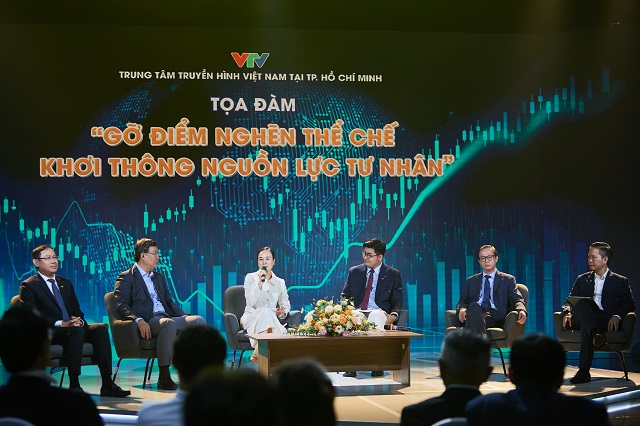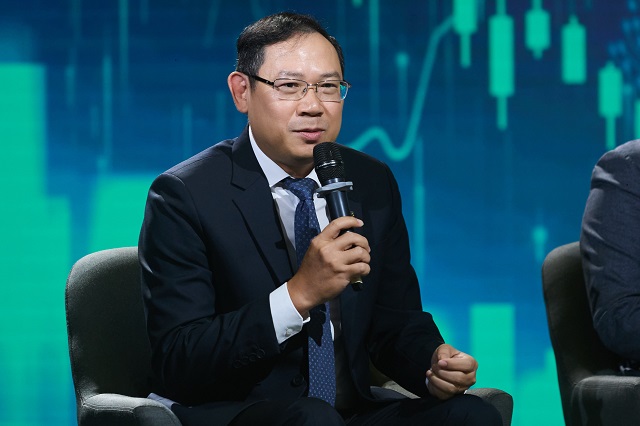
Dr. Nguyen Xuan Thanh – Senior Lecturer at Fulbright School of Public Policy and Management
|
Dr. Nguyen Xuan Thanh, Senior Lecturer at the Fulbright School of Public Policy and Management, shared at the seminar that international experience shows that all economies that maintain sustainable growth have one thing in common: a strong and central domestic private sector.
According to Dr. Thanh, Vietnam is facing an urgent need to boost its economic growth, and developing the private sector cannot be merely a political message; it requires specific institutional breakthroughs.
Dr. Thanh also analyzed the new policies in Resolution 68, Resolution 139, and the actions undertaken by the government, which have outlined various approaches to resource mobilization.
In terms of land access, the government is looking to re-exploit unused public land; support small, high-tech, and innovative startups in leasing land in industrial parks with a minimum area. Regarding capital access, there are plans to diversify credit channels, unblock the corporate bond market, amend laws to expand support to more businesses, and simplify loan procedures.
Dr. Thanh pointed out that the current “bottleneck” lies in implementation. Merely issuing policies is not enough; what matters is whether these policies create a mechanism for businesses to access resources fairly and efficiently.
On land issues, he proposed re-exploiting unused public land, supporting businesses in leasing land in industrial parks and technology incubators, especially for small, high-tech, and innovative startups.
Regarding investment capital, there is a need to diversify credit channels, unblock the corporate bond market, and amend the Law on Supporting Small and Medium-sized Enterprises to simplify procedures and expand the scope of support. Policies should not just be slogans. Support must come from real resources, avoiding the “begging” mechanism, and absolutely not creating additional cumbersome supervisory apparatus.
Barriers lie in implementation and mindset

Seminar on “Unblocking Institutional Bottlenecks to Unleash Private Resources” on the morning of May 27.
|
Experts affirmed that although policies for private economic development have been issued simultaneously and rapidly, their implementation is still facing many obstacles.
According to many enterprises, prominent bottlenecks include complicated and time-consuming administrative procedures, wasting time and costs for enterprises; difficulties in accessing land and credit, especially at the local level, where central policies are not fully or synchronously implemented; inconsistent application of policies, leading to different interpretations and enforcement by different agencies. In addition, the regulatory sandbox framework is still new and lacks specific implementation guidance, making it challenging for innovative startups to access. Notably, capital access remains a significant obstacle for both small and medium-sized enterprises and large corporations implementing large-scale projects.
Sharing at the seminar, Ms. Nguyen Thanh Huong, Investment Director of Nam Long Group, said that since the issuance of Resolution 68, the private business community has been energized and gained more confidence. This is a significant step forward, giving businesses more confidence when working with international partners.
In the past 3-4 years, the suspension of many real estate projects has prevented foreign investment from flowing into Vietnam as expected. Meanwhile, many international partners are still very interested in the Vietnamese market and are willing to invest for the long term.
“We very much hope that the policies will be soon concretized. When resources are unblocked, participating in large projects such as transportation-oriented development (TOD) will become more feasible. Nam Long and its partners are ready to participate if the implementation mechanism is transparent and timely,” emphasized Ms. Huong.
More specific policies and simpler procedures are needed to unblock capital flows

Mr. Tu Tien Phat – CEO of ACB
|
Mr. Tu Tien Phat, CEO of ACB, stated that capital has always been a top concern for the business community, especially given the current economic uncertainties and the rising financial costs. Designing a flexible, practical, and coherent financial policy system is key to empowering private enterprises to thrive.
According to Mr. Phat, ACB currently serves over 1 million enterprises, most of which are small and medium-sized enterprises and individual business households – entities that are agile but also vulnerable to market and policy changes.
“As a private bank, we understand the transformation journey of the private sector. Businesses are very willing to invest and innovate, but they need to see concrete and transparent policies”, emphasized Mr. Phat.
He also outlined four factors that enterprises desire most from the banking system and the current financial policies: reduced capital access costs, streamlined procedures, comprehensive digitalization, and a shift towards green transformation.
Experts at the seminar agreed that to truly unleash the potential of the private sector, a two-way journey is necessary. The state must implement decisive and effective policies, and enterprises must proactively innovate and adapt flexibly.
- Substantively reduce at least 30% of administrative procedures by the end of 2025, as committed by the Government.
- Establish an independent monitoring mechanism to oversee policy implementation at local levels, ensuring no “bottlenecks” at the grassroots.
- Enhance regular public-private dialogues with the participation of associations, business communities, and representatives from relevant ministries and sectors.
- Promote enterprise model innovation, encourage chain linkage, digital transformation, and enhance governance capacity to maximize the new policy space.
- Improve access to capital, especially for small, innovative, and green development projects.
The Golden Conundrum: Why Does Importing Gold Spark Fears of Currency Drain, While Cigar and Liquor Imports Go Unscrutinized?
“Gold, according to Dr. Le Xuan Nghia, is an extremely important reserve. Vietnam only needs to import around $3-4 billion worth of gold annually, yet many worry about ‘foreign currency outflow’. In contrast, the import of foreign liquor, cigars, and cigarettes amounts to $8 billion yearly, an issue that rarely sparks concern. This irony is quite absurd.”
“Vietnam’s North-South High-Speed Rail: Catalyzing the Nation’s Industrial Renaissance”
High-speed rail networks in Japan, South Korea, and China have done more than just bridge geographical gaps and connect regions; they have catalyzed the formation of high-tech industries worth hundreds of billions of dollars. With the proposed North-South high-speed rail project, Vietnam stands at a “once-in-a-century” opportunity to forge a new industrial springboard for the nation on the threshold of its aspirational ascent.
Can Agricultural Land Within Residential Areas With No Access Be Converted to Residential Land?
“Navigating the complexities of land ownership, the Department of Agriculture and Environment sheds light on a critical inquiry: Can landlocked parcels, devoid of access, metamorphose into residential oases? This insightful exploration delves into the transformative possibilities, offering guidance and clarity to curious citizens.”
“Collaborating to Develop Solutions for the Da Nang Free Trade Zone”
On May 23, 2025, the city of Da Nang, Vietnam, witnessed a significant development with the signing of a Memorandum of Understanding between the People’s Committee of Da Nang City and the Bank for Investment and Development of Vietnam (BIDV). This milestone agreement paves the way for a strategic collaboration to create innovative financial technology solutions for the Da Nang Free Trade Zone.





















